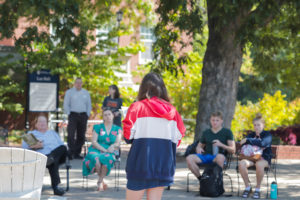Born in Russia, UMW sophomore Katia Savelyeva has called America home for most of her life. But the English major sometimes wonders what it would be like had she stayed in St. Petersburg.

“I hope I’d still do things that don’t require as much bravery here in the United States,” said Savelyeva, who read aloud on Campus Walk Wednesday from a young adult book that was banned in an American school district, as part of Mary Washington’s annual Read Out event.
Held every September, this national awareness campaign by the American Library Association (ALA) and other organizations puts a spotlight on attempts to censor, challenge and ban books in libraries and schools. A collection of events and displays across campus this week highlights the need to “keep the light on” and celebrate the freedom to express all ideas.
Banned Books Week began in the 1980s as the Supreme Court weighed whether school officials could prohibit the reading of books based solely on their content. They can’t, but numerous books are challenged each year in schools nationwide.
In celebration, students, staff, faculty and administrators – including Provost Nina Mikhalevsky, Associate Vice President and Dean of Student Life Cedric Rucker, and Associate Professor of Education Janine Davis – gathered in front of Lee Hall this morning to read excerpts from banned books. The English department will also focus on censored literature in its weekly poetry and prose reading this afternoon from 5 to 6 p.m. in Combs Hall.
Teaching high school English in California, it was almost unheard of for books to be challenged in her school district, Davis said. But when she moved to Virginia, her new school presented her with a long list of literature she couldn’t use in her classroom.
“I was shocked,” said Davis, who read from Jeannette Walls’ The Glass Castle, challenged for featuring sexual assault, alcoholism and abuse. “It’s by reading books involving difficult personal stories that we can begin to imagine what it’s like to live in a world that is different from our own – or, for some, to see themselves reflected in these works.”
Classics often make the ALA’s list of books that have faced objections – Of Mice and Men, The Catcher in the Rye and To Kill a Mockingbird are on there, as well as children’s books like the Captain Underpants and Skippyjon Jones series. Those recently challenged often include LGBT themes or characters, or people of color or those with disabilities, said James Pape, outreach librarian with Simpson Library, which sponsors the Read Out event along with the UMW Bookstore; Department of English, Linguistics and Communication; and the Office of Student Activities and Engagement.

That’s why Savelyeva volunteered to read. Assistant Professor of Writing and Digital Studies Brenta Blevins approached her after Savelyeva wrote an article on young adult LGBT fiction in UMW’s student newspaper, The Blue & Gray Press.
“At Mary Washington, we’re educating members of a society that needs to grapple now and in the future with serious concerns facing humanity,” Blevins said. “We must engage with diverse perspectives to solve these problems.”
At the Read Out event, Savelyeva shared an excerpt from emily m. danforth’s The Miseducation of Cameron Post. After she came out in 2015, Savelyeva read the coming-of-age novel about a teenager in rural Montana who discovers her homosexuality. It had been removed from an honors program reading list by a Delaware school district a year earlier.
Many focus on the book’s intense passages, such as when the teen is sent to a conversion camp, said Savelyeva. She chose to read the opening chapter, featuring the protagonist’s first kiss. Cameron soon learns her parents have died in a car crash, leaving the experiences intertwined in her memory.
“Her world breaks wide open and you begin to understand her as a character,” said Savelyeva, who aspires to the “sense of peace and freedom Cameron feels in the last chapter.”
Everyone has a right to share their opinions, and it’s OK to disagree with or criticize a book, said Savelyeva.
“But we won’t have the opportunity to do even that if books are pulled off the shelves.”



